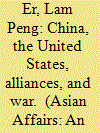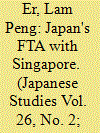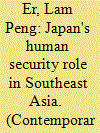| Srl | Item |
| 1 |
ID:
148941


|
|
|
|
|
| Summary/Abstract |
Chinese President Xi Jinping emphatically rejects the so-called Thucydides Trap and its analogy that a rising China is destined for war with the United States, the status quo great power. But there is a contradiction between Beijing's peaceable rhetoric about a “New Type of Major Power Relations” with the US, and Beijing's disregard for the US and its allies. concerns about rising Chinese assertiveness in the East and South China Seas. It is not inconceivable that smaller Chinese and American allies in East Asia might well drag the US and China into a conflict rather than a conflict directly caused by the “power transition” between the two great powers per se.
|
|
|
|
|
|
|
|
|
|
|
|
|
|
|
|
| 2 |
ID:
074972


|
|
|
|
|
| Publication |
2006.
|
| Summary/Abstract |
Japan's Free Trade Agreement (FTA) with Singapore is the very first it has forged with any country. Tokyo has at least two motivations: to avoid losing out to Beijing strategically and economically as the Chinese seek to forge an FTA with the Southeast Asian countries, and using Singapore (which lacks an agricultural sector) as the thin end of the wedge to push for FTAs with other countries. Japanese and Chinese competition to clinch and implement FTAs in Southeast Asia may well lead to a nascent East Asian regionalism.
|
|
|
|
|
|
|
|
|
|
|
|
|
|
|
|
| 3 |
ID:
071632


|
|
|
|
|
| Publication |
2006.
|
| Summary/Abstract |
Japan is playing an active human security role in postCold War Southeast Asia, especially in crises where thousands of lives are at stake, displaced, or even lost. This approach includes: providing massive financial assistance to the region during the 199798 Asian financial crisis, engaging in peacemaking in Cambodia and Aceh, peacebuilding in East Timor, Aceh, and Mindanao, offering financial and medical assistance when East Asia was hit by the SARS epidemic, and deploying the largest contingent of Japanese troops since the end of World War II for humanitarian assistance to tsunami-stricken Aceh in early 2005. A broad human security framework which encompasses peacemaking, post-conflict peacebuilding, and the dispatch of troops for humanitarian relief in Southeast Asia allows Japan to not only play a more active political role but also to avoid being branded as an aspiring military power by its domestic and international critics.
|
|
|
|
|
|
|
|
|
|
|
|
|
|
|
|